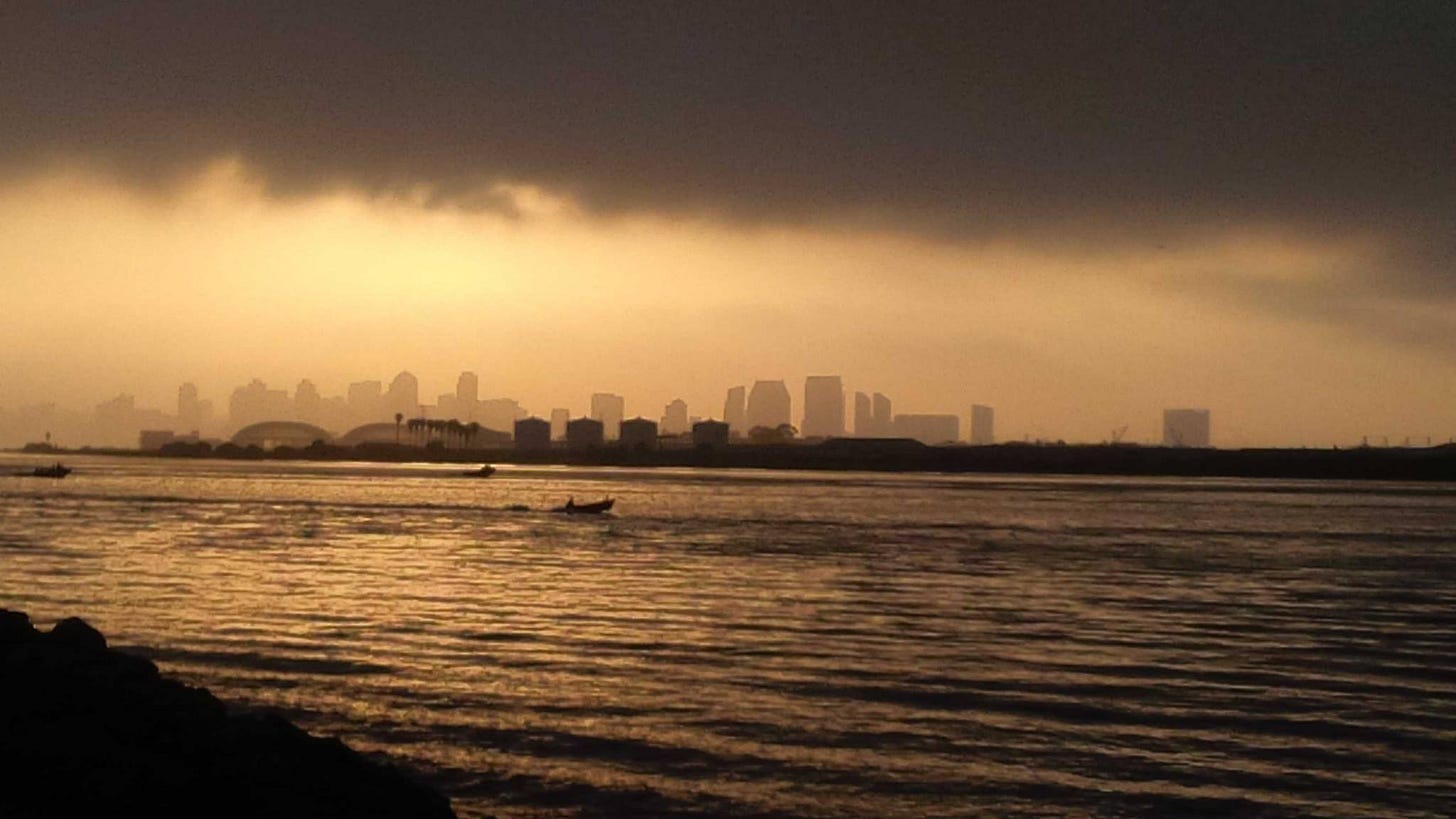No, It's Not Safe to Travel to the United States. Yes, It's Really That Bad.
Tourists, remote workers, and even green card holders are being locked up over visa technicalities, sometimes for weeks. And once you’re in, the system is designed to keep you there.
Craving community on your path to working from anywhere? Join our free Work From Anywhere ✈️ group and connect with like-minded midlife nomads!

I’ve seen the same question popping up in nomad groups and travel forums: I had plans to go to the U.S. for work/study/tourism… is it really that bad?
The short answer? Yes.
Changing travel plans is expensive; it sucks, and I get it. Our (Canadian) family canceled our March Break trip because our flights required transiting through the U.S. With a foreign exchange student in our group, I was having serious anxiety about it.
So, we ate the cost of an accommodation deposit, rebooked flights, and rerouted to avoid U.S. airspace altogether.
Featured:
Skipping the U.S. might feel extreme. Each traveller has to assess their own risk tolerance. But I worry for you. I hope you’ll heed the warnings. Right now, I cannot in good conscience recommend that nomads, remote workers, expats, or tourists enter the U.S. and, in fact, strongly advise against it.
For years, travellers have expected extra scrutiny at U.S. borders… an aggressive customs agent here, a secondary screening there. As a white Canadian, I’ll admit my worries have been far less than many others. Yet even during Trump’s first term, policies allowing border agents to copy and store hard drive contents (even cloud accounts) kept me—and many others who work in tech and the information economy—out of the U.S. for years.
But what’s happening now is different. Travellers are being detained indefinitely, sometimes for weeks, sometimes longer. It doesn’t matter if you have a valid visa, a return ticket, or a clean record.
A paperwork mistake, an agent’s suspicion, or simply being in the wrong place at the wrong time can land you in an ICE detention facility, where getting out isn’t as simple as proving your case.
This isn’t paranoia; it’s happening.
Unlike in most countries where immigration mistakes lead to a denied entry and a flight back home, in the U.S., they can land you in a for-profit detention centre incentivized to keep you locked up as long as possible.
Subscribe now to get more tips, resources, and stories on location-independent business and lifestyle from Midlife Nomads.
And now, the Trump administration has made it clear that even the courts can’t stop them.
Recently, the administration defied a federal judge’s order and secretly deported hundreds of Venezuelan nationals to El Salvador, where they will be imprisoned for at least a year under a deal that saw the U.S. pay the Salvadoran government $6 million.
This isn’t deportation. This is outsourcing indefinite detention to a third country—without due process and in direct violation of the courts.
Even if we give them the benefit of the doubt and assume every person on those planes was the worst of the worst criminal gangster, this was still a litmus test to see if they could blatantly defy the courts.
And they did.
Recommended reading:
This level of lawlessness should be alarming to everyone, especially travellers. If the administration is willing to ignore court rulings on mass deportations, what protections do you think you’ll have as an individual if you’re detained at the border?
That’s just the immigration side of things.
The U.S. is also seeing an alarming rise in attacks on women’s rights, LGBTQ+ protections, and racial minorities. States are rolling back reproductive rights, targeting gender expression, and escalating police violence. Hate crimes are up, and in many places, law enforcement isn’t on your side.
I don’t want to debate the politics of this.
It’s not about left or right. It’s about your personal safety, and mine.
And right now, the U.S. is not a safe place for travelers—especially women, and particularly minorities and people already marginalized by the U.S. government.
Arguably the most pressing issue for travelers right now is the abuse of the U.S. immigration detention system. As a for-profit enterprise, ICE detention centers were problematic even before recent escalations but under this administration, the situation has become dire.
The U.S. has the largest immigration detention system in the world, with over 200 facilities currently holding more than 44,000 detainees. Many of these individuals—including tourists, visa holders, and asylum seekers—are detained due to minor paperwork issues or bureaucratic errors. Once inside, they face indefinite detention in facilities that profit from keeping them there as long as possible.
Recommended reading:
Just a few examples from people who had the resources to fight back:
ICE Detention: A For-Profit Nightmare - The Guardian
Jasmine Mooney, a Canadian citizen with a legally approved work visa, was detained without explanation by U.S. Immigration and Customs Enforcement (ICE) and held for nearly two weeks. Despite having no criminal record, legal representation, and media attention, she was trapped in a bureaucratic nightmare where no one could—or would—tell her when she’d be released.
Her experience exposed a harsh truth: ICE detention is not just about immigration enforcement; it’s a business. Private prison companies profit from each detainee, creating an incentive to keep people locked up as long as possible. Mooney’s case is a chilling reminder that even if you're taken into custody by mistake, the system is designed to keep you there—for profit, not justice.
Canadian Folk Duo Detained Over Baseless Drug Accusations - Halifax Examiner
Nova Scotia-born folk musicians Cassie and Maggie were tailed by an Ohio state trooper for 30 minutes before being pulled over and questioned about fentanyl trafficking—despite having no ties to drugs whatsoever. Their car was searched by a drug-sniffing dog, and they were separately interrogated about their loyalty to Canada versus the U.S.
This bizarre and unfounded suspicion is part of a growing conspiracy theory that blames Canada for America’s opioid crisis, a narrative increasingly used to justify political hostility and trade wars. More than just a routine traffic stop, their experience highlights how misinformation fuels unnecessary aggression toward Canadian travelers in the U.S.
ICE Detains British Backpacker for Weeks Over Visa Mix-Up - The Guardian
Rebecca Burke, a 28-year-old British graphic artist, was detained for three weeks in a U.S. immigration facility after a paperwork error led to her being refused entry from Canada. Despite being a non-criminal traveler with no intent to overstay, she was handcuffed, held in “horrendous conditions,” and denied legal representation.
Again, her case underscores a brutal reality: once ICE detains you—even by mistake—the system is designed to keep you there. Immigration detention is a for-profit industry, and the longer detainees are held, the more money these facilities make. Burke was only released after media attention and nearly £10,000 in crowdfunding for legal fees—resources many detainees don’t have.
These are just the stories we know about, the cases where people had media coverage, legal resources, and public attention. For every name in the headlines, there are many more trapped in the system with no way out.
It’s easy to think, this won’t happen to me. But a visa holder, a tourist, or even a permanent resident can suddenly find themselves in a system designed not to release them, but to profit from their detention.
✈️ Looking Beyond the U.S.?
Feeling uneasy about U.S. travel right now? Our Smart Guide + AI Travel Coach tool helps travellers find better-aligned, safer destinations based on your budget, values, and priorities. It’s like having a relocation advisor in your pocket.
So if you’re asking, is it really that bad? The answer is still yes, and it is only getting worse.
Where you travel is your decision, but I wouldn’t risk it—just as I wouldn’t risk traveling to any other country where the rule of law and democracy was failing. There are so many incredible places in the world to explore, work remotely, and experience new cultures without worrying about being detained indefinitely.
Instead of heading to the U.S., why not consider Canada, Mexico, Portugal, or Thailand? Latin America is full of vibrant and affordable cities that welcome digital nomads. Europe offers history, safety, and excellent infrastructure. Southeast Asia has long been a hub for remote workers, and countries like Japan and South Korea offer an amazing mix of culture and modern convenience.
There are places that want us there; where travellers are appreciated, respected, and treated like guests, not suspects. The world is still full of open doors, welcoming communities, and life-changing experiences. You don’t have to let fear limit you, but you do have to be smart about where you go.
Go where you are wanted. Go where you are valued. Go where you are free.
Unfortunately, it just doesn’t look like the United States will make that list for a while.
You might also like:








Not me hyperventilating about going homeeeee 🙂🙃🙂🙃🙂🙃🙂🙃 but also very helpful to read even in December 2025